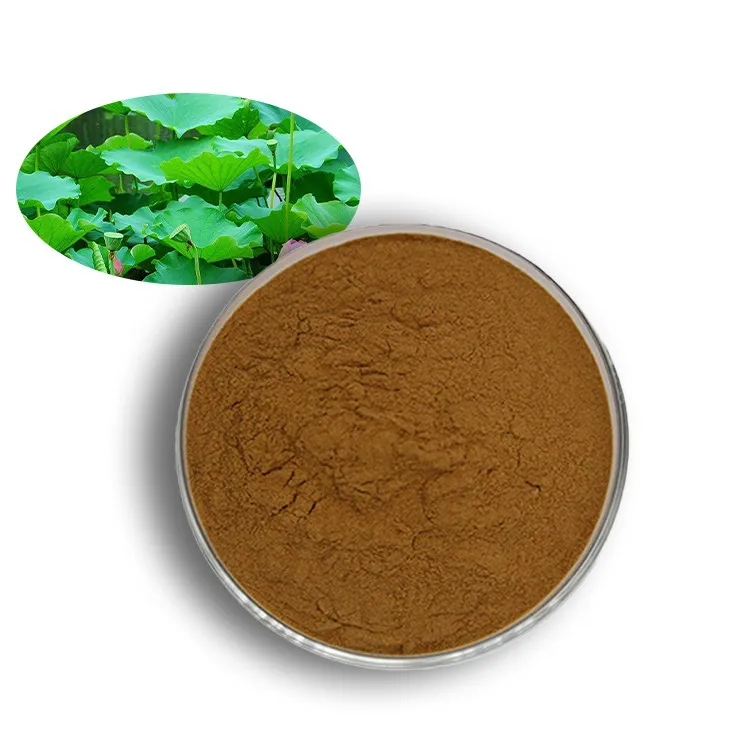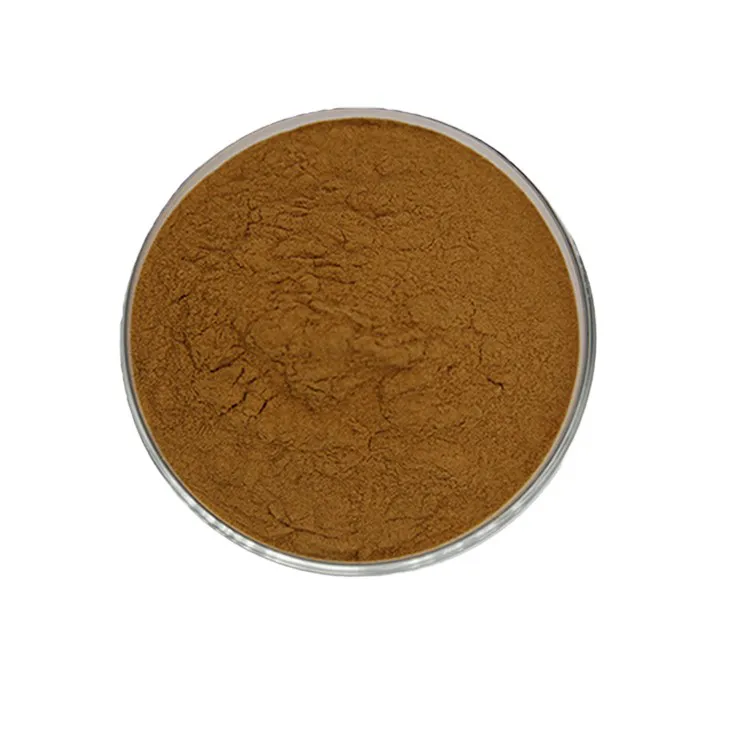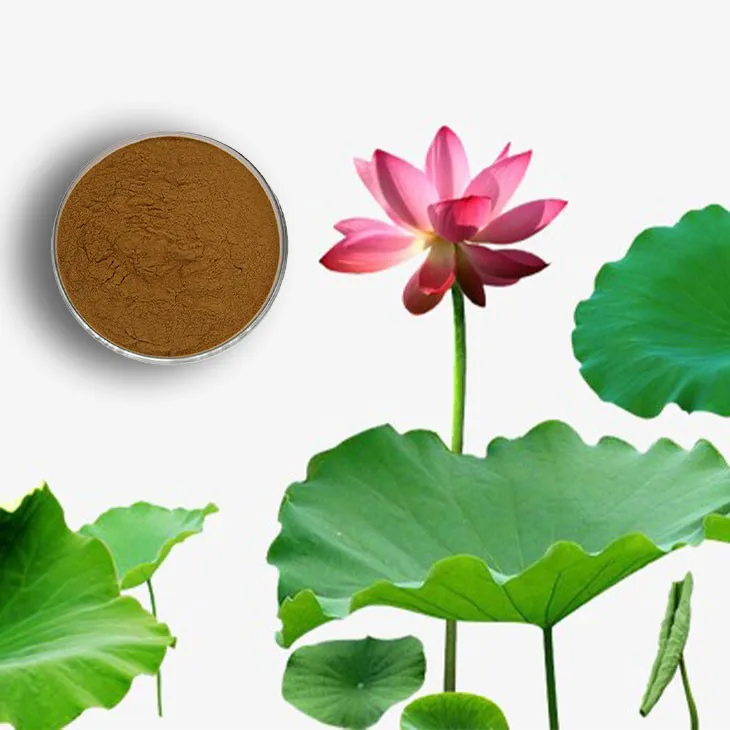- 0086-571-85302990
- sales@greenskybio.com
Five Efficacy of Lotus Leaf Extract + Dosage, Side Effects
2024-11-13

1. Introduction
Lotus, a plant with deep cultural and medicinal significance in many parts of the world, has been studied for its various health - promoting properties. The Lotus leaf extract, in particular, has drawn considerable attention in recent years. It is rich in bioactive compounds that are believed to offer multiple benefits for human health. In this article, we will explore the five main efficacy of Lotus leaf extract, as well as discuss the appropriate dosage and potential side effects.

2. Efficacy of Lotus leaf extract
2.1 Weight Management
One of the most well - known benefits of lotus leaf extract is its potential role in weight management. The extract contains compounds that may interfere with the body's fat absorption process. For example, it has been suggested that certain components in the lotus leaf extract can inhibit the activity of lipase, an enzyme responsible for breaking down fats in the digestive system. This inhibition can lead to a reduction in the amount of dietary fat that is absorbed by the body, potentially contributing to weight loss over time.
Moreover, lotus leaf extract may also have an impact on the body's metabolism. It could potentially increase the basal metabolic rate, which is the amount of energy the body burns at rest. This means that even without additional physical activity, the body may be burning more calories when lotus leaf extract is consumed regularly. However, it should be noted that while lotus leaf extract can be a helpful addition to a weight - loss regimen, it is not a substitute for a healthy diet and regular exercise.
2.2 Antioxidant Properties
Lotus leaf extract is rich in antioxidants, substances that play a crucial role in protecting the body against oxidative stress. Oxidative stress occurs when there is an imbalance between the production of free radicals (unstable molecules) and the body's ability to neutralize them with antioxidants. Free radicals can damage cells, proteins, and DNA, and are associated with a variety of health problems, including aging, heart disease, and cancer.
The antioxidants present in lotus leaf extract, such as flavonoids and phenolic compounds, can scavenge free radicals and prevent them from causing harm. By reducing oxidative stress, these antioxidants may help to maintain the health of cells and tissues throughout the body. They may also have anti - inflammatory effects, which can further contribute to overall health and well - being.
2.3 Blood Sugar Regulation
Another important efficacy of lotus leaf extract is its potential in blood sugar regulation. Some studies have shown that the extract may help to lower blood glucose levels in individuals with diabetes or those at risk of developing diabetes. This may be due to its ability to enhance insulin sensitivity.
Insulin is a hormone produced by the pancreas that helps cells to take up glucose from the bloodstream. In individuals with diabetes, the body either does not produce enough insulin or the cells become resistant to its effects. Lotus leaf extract may help to improve the body's response to insulin, allowing cells to more effectively take up glucose and thereby reducing blood sugar levels. However, more research is needed to fully understand the mechanisms involved and to determine the optimal dosage for blood sugar control.
2.4 Cholesterol - Lowering Effect
Lotus leaf extract has also been found to have a cholesterol - lowering effect. High cholesterol levels, particularly elevated levels of low - density lipoprotein (LDL) cholesterol (often referred to as "bad" cholesterol), are a major risk factor for heart disease. The extract may work by inhibiting the synthesis of cholesterol in the liver or by increasing the excretion of cholesterol from the body.
Some components in the lotus leaf extract may interact with enzymes involved in cholesterol metabolism, such as HMG - CoA reductase. By inhibiting this enzyme, the production of cholesterol can be reduced. Additionally, the extract may also help to increase the levels of high - density lipoprotein (HDL) cholesterol (the "good" cholesterol), which helps to remove LDL cholesterol from the bloodstream. This dual action on cholesterol levels can potentially contribute to a reduced risk of heart disease.
2.5 Diuretic Function
The lotus leaf extract has a diuretic function, which means it can increase urine production. This can be beneficial for several reasons. Firstly, increased urine production can help to flush out excess water and toxins from the body. This can reduce swelling and bloating, especially in individuals with fluid retention problems.
Secondly, the diuretic effect may also have an impact on blood pressure. By reducing the volume of fluid in the bloodstream, blood pressure may be lowered. However, it is important to note that while lotus leaf extract can have a mild diuretic effect, it should not be used as a substitute for medical treatment in cases of high blood pressure or other serious medical conditions. Diuretic medications are often more potent and are prescribed based on a comprehensive medical evaluation.

3. Dosage of Lotus Leaf Extract
The appropriate dosage of lotus leaf extract can vary depending on several factors, including the individual's age, health status, and the specific purpose for which it is being used.
For general health promotion: A typical dosage might be around 500 - 1000 mg per day. This can be taken in divided doses, such as two or three times a day, with meals or as directed by a healthcare provider.
For weight management purposes: Some studies have used dosages in the range of 1000 - 1500 mg per day. However, it is important to combine the use of lotus leaf extract with a healthy diet and regular exercise for optimal results. It is also advisable to start with a lower dose and gradually increase it to assess tolerance.
For blood sugar or cholesterol regulation: Dosages may need to be more carefully adjusted based on the individual's baseline levels and response. In these cases, it is crucial to work closely with a healthcare provider who can monitor blood sugar or cholesterol levels and make appropriate dosage adjustments. Starting dosages might be in the range of 500 - 1000 mg per day, but this may need to be modified depending on the results of regular monitoring.

4. Side Effects of Lotus Leaf Extract
While lotus leaf extract is generally considered safe for most people when used appropriately, there are some potential side effects that should be noted.
Gastrointestinal Disturbances: One of the most common side effects is mild gastrointestinal upset. This can include symptoms such as nausea, vomiting, diarrhea, or abdominal discomfort. These symptoms are more likely to occur when higher doses are used or when the extract is first introduced into the diet. To minimize these effects, it is recommended to start with a low dose and gradually increase it, and to take the extract with food.
Allergic Reactions: Although rare, some individuals may be allergic to lotus leaf extract. Allergic reactions can range from mild symptoms such as skin rashes, itching, or hives to more severe symptoms such as difficulty breathing or swelling of the face, lips, or tongue. If any signs of an allergic reaction occur, the use of the extract should be discontinued immediately and medical attention should be sought.
Interactions with Medications: Lotus leaf extract may interact with certain medications. For example, if it has a diuretic effect, it could potentially interact with other diuretic medications or medications that affect blood pressure. It may also interact with medications used for blood sugar control or cholesterol - lowering drugs. Therefore, it is important to inform your healthcare provider if you are taking lotus leaf extract, especially if you are on any other medications.

5. Conclusion
Lotus leaf extract offers several potential health benefits, including weight management, antioxidant properties, blood sugar regulation, cholesterol - lowering effects, and a diuretic function. However, it is important to use it in the appropriate dosage and be aware of the potential side effects. As with any natural remedy, it is always advisable to consult with a healthcare provider before starting to use lotus leaf extract, especially if you have any pre - existing health conditions or are taking other medications.
FAQ:
What are the five efficacy of lotus leaf extract?
Lotus leaf extract is often considered to have functions such as promoting fat metabolism, which may help with weight management. It also has antioxidant properties that can combat free radicals in the body. Additionally, it may have a certain effect on improving digestion, reducing blood lipid levels, and having a mild diuretic effect.
What is the appropriate dosage of lotus leaf extract?
The appropriate dosage of lotus leaf extract can vary depending on factors such as the form of the extract (powder, capsule, etc.) and the individual's health condition. Generally, for powdered lotus leaf extract, a common dosage might be around 1 - 3 grams per day. However, it is crucial to follow the instructions on the product label or consult a healthcare professional before use.
Are there any side effects of lotus leaf extract?
Some potential side effects of lotus leaf extract may include digestive discomfort such as nausea, abdominal pain, or diarrhea, especially if taken in excessive amounts. In addition, it may interact with certain medications, so it is important for people taking other drugs to consult a doctor before using lotus leaf extract.
Can lotus leaf extract be used for long - term?
While lotus leaf extract has certain health - promoting effects, long - term use should be cautious. Prolonged use may increase the risk of potential side effects. It is advisable to periodically assess the body's response and consult a healthcare provider if considering long - term use.
How does lotus leaf extract promote fat metabolism?
Lotus leaf extract may contain certain bioactive compounds that can interact with the body's metabolic processes. These compounds may influence enzymes related to fat breakdown and energy utilization, thus promoting fat metabolism. However, more research is needed to fully understand the exact mechanisms.
Related literature
- The Pharmacological Properties of Lotus Leaf Extract: A Review"
- "Lotus Leaf Extract: Efficacy, Safety, and Dosage Considerations"
- ▶ Hesperidin
- ▶ citrus bioflavonoids
- ▶ plant extract
- ▶ lycopene
- ▶ Diosmin
- ▶ Grape seed extract
- ▶ Sea buckthorn Juice Powder
- ▶ Beetroot powder
- ▶ Hops Extract
- ▶ Artichoke Extract
- ▶ Reishi mushroom extract
- ▶ Astaxanthin
- ▶ Green Tea Extract
- ▶ Curcumin Extract
- ▶ Horse Chestnut Extract
- ▶ Other Problems
- ▶ Boswellia Serrata Extract
- ▶ Resveratrol Extract
- ▶ Marigold Extract
- ▶ Grape Leaf Extract
- ▶ blog3
-
High purity olive leaf extract
2024-11-13
-
Lavender oil extraction method
2024-11-13
-
100% organic virgin sea buckthorn fruit oil
2024-11-13
-
Lotus leaf extract powder factory in China
2024-11-13
-
China aged garlic extract supplier
2024-11-13
-
Deer antler extract powder manufacturer
2024-11-13
-
Saw palmetto extract vs whole herb
2024-11-13
-
Golden Seal Extract
2024-11-13
-
Sugarcane Extract
2024-11-13
-
Hericium erinaceus extract powder
2024-11-13
-
Bitter Melon Extract
2024-11-13
-
Cassia Seed Extract
2024-11-13
-
Curcuma Longa Extract
2024-11-13
-
Fenugreek Extract Powder
2024-11-13
-
Artichoke Leaf Extract
2024-11-13
-
Chia Seed Powder
2024-11-13
-
Yam Extract
2024-11-13





















